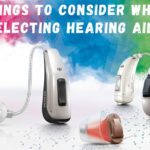Many factors can cause hearing loss for people across diverse populations and age groups. A burst eardrum, head trauma, heredity, and aging are a few. According to the World Health Organization (WHO), over 5 percent of the world’s population, about 466 million people, has disabling hearing loss. Due to stigma and access, it can often take someone with a hearing loss up to seven years to get their hearing checked and get hearing aids.
It is imperative to take proactive steps to ensure your hearing heath. The perfect place to begin is to schedule an appointment to get a hearing test and be fitted for a hearing aid. There are many resources available so that you’ll never be at a loss for information.
Set Aside Plenty of Time
When scheduling your trip to a get fitted for a hearing aid, set aside plenty of time. You want to make sure that you can ask plenty of questions and take notes; the audiologist will have lots of information for you, too. Be prepared to tell them about your lifestyle, any hobbies you may have, and other specific needs you hope a hearing aid will meet. This information helps an audiologist choose an appropriate aid for you. The last thing you want to do is schedule your appointment between a day of errands. You’ll want to be thorough and take your time—hearing aids are a big investment!
Prepare Questions
You’ve done some online research. You found a reputable website and took a hearing test. You’ve even read a few studies on the effects of hearing loss. After all of that, you still have questions—and that’s good! Walking into your appointment with some questions in hand is a great way to get information specific to your needs.
You may feel inundated with information about one or more hearing aids and you should ask questions when you have them or write them down to ask later. This is totally normal — there are many features available to you, from rechargeable hearing aids like the Signia Styletto, to Bluetooth-enabled devices that connect to your smartphone. This appointment is for you and you should feel comfortable asking for clarification if something is unclear or ask for more information about something you found while doing your online research.
Bring a Friend or Relative
Bringing a friend or relative is a great way to feel supported in your journey to better hearing health. It recognizes that your hearing loss affects not only you, but also your loved ones. As there tends to be much information to learn, a companion can ask questions with you during your visit. The two of you can take notes, as well, even though the doctor will provide you with printed information. Your retention of information is likely to be higher if you write down key points yourself. Aside from the benefits during the appointment, the two of you together you will recall much more afterward, too—two heads are better than one!
Last Steps
Being ready to face your hearing loss is seldom an easy endeavor. It’s a feat that takes courage and honesty, but act on it you must. If hearing loss is left untreated, you may become more at risk for developing dementia and Alzheimer’s, diseases known for the deterioration of brain function. Remember, your brain is responsible for translating sound collected in the ear canal into information. Researchers from the study at Johns Hopkins and the National Institute on Aging believe that social isolation, a common result of untreated hearing loss, and auditory depravation are factors that can lead to the diagnoses mentioned above.
However, when you begin to make accommodations for your hearing loss—and ask others to do the same—you’ll find yourself happier, more social, successful at work, and at less risk for anxiety and depression. Improving your hearing health can be a process of re-learning that takes time and adjustment and, like visiting the audiologist’s office, you don’t have to do this step alone either. Ask your doctor about audiological rehabilitation and if group sessions would be a good fit for you. These are sessions that help people cope with hearing loss, use hearing aids, and provide other tools for commanding communication on your own terms again.
No easy endeavor, right? The end result, however, can be quite rewarding, knowing that your hearing loss didn’t hinder the life you envisioned for yourself.






